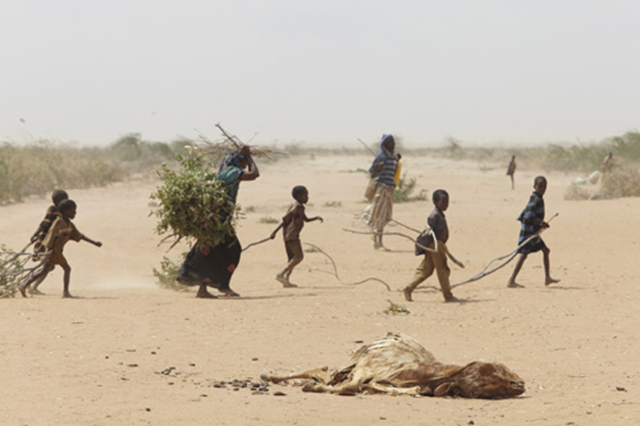In Africa, a perfect storm for food security
By Glenn Ashton
28 August 2012 Food prices are rapidly heading toward new record territory, with far more at play than a simple drought in the US Midwest. There are serious implications, especially for nations with high rates of inequality and poverty. We will almost certainly face a potentially catastrophic, global scale famine in the next couple of decades. The main reason there are now over seven billion people on earth is largely due to the emergence of two separate technologies. Firstly, cheap fossil fuels have enabled us to grow food on industrial scales. We presently require around 10 calories of fossil fuel energy to produce one calorie of food. A century ago each calorie of energy expended produced two calories of food. Secondly, advances in health care, primarily antibiotics and vaccines, have increased human life-spans. It is an increasing challenge to feed this exponentially increasing population. We produce sufficiently for everyone on earth to have enough food, yet despite this cornucopia a significant proportion of people cannot afford to eat properly. Why? There are three major reasons for this. Firstly, unequal wealth distribution. Secondly, meat consumption has grown as wealth has increased. Grazing area for meat production, mainly beef, uses more than a quarter of ice-free land surface. Additionally, more than a third of all cropland is used to grow crops to feed livestock. These are produced using energy intensive, industrial agricultural practices. Third, the risks associated with diminishing energy supplies has encouraged wealthy governments to promote the production and consumption of “biofuels”. These are produced from agricultural resources such as sugar cane, beet, maize, soy, and oil crops such as palm oil and canola. This focus on biofuels – which opponents prefer to call agro-fuels because of their propensity to divert scarce agricultural resources toward fuel crops – has caused an unprecedented shift in focus in agricultural production from food production to growing fuel crops. As a result swathes of sensitive ecosystems have been destroyed to be planted by monocultures like palm oil, sugar cane, maize and soy. High oil prices have provided a potent economic incentive to underpin this ecologically disastrous shift. This destruction is occurring from the jungles of Indonesia – displacing iconic species like ourang-outang – to West Africa, where local communities are expelled in order to attract “foreign investment” and plant agrofuel crops. Biofuel production has a clear impact on global food reserves, which are presently approaching historical lows. Last year nearly 40% of the US maize crop went into ethanol for fuel. Because the US is the world’s largest maize producer this has serious implications for global food trade. This is especially so in light of this year’s serious drought across the Midwest. Maize prices have risen to record levels, nearly double that of last year. High oil prices will maintain demand for maize ethanol, perpetuating the insanity of food for fuel. The global trade in these commodity crops is dominated by three corporations – Cargill, Bunge and Archer Daniel Midland – each deeply involved in both ethanol production and market hedging and speculation. This commodification of food leaves food security at the mercy of the market. There is no central global oversight or planning to secure sufficient food stocks as a buffer. Food is controlled by the market, not by logic, and certainly not by benevolence. […] In turn, climate change is increasingly related to instability in agricultural productivity. Sharply increased levels of carbon dioxide and more recently, methane released as the Arctic fringe rapidly thaws, has exacerbated this uncertainty. This feedback spiral places agricultural production at further, direct risks. Climate change is more about increasingly unpredictable and extreme weather events than pure “warming.” The harbingers of these changes are events like droughts in the US Midwest, Russia, South Asia, melting of the Arctic ice cap and permafrost and floods in Pakistan, Burma, and North Korea. […]
